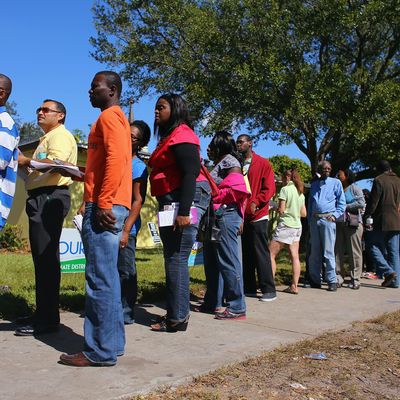
There are probably no states where Establishment Republican majorities have been more aggressive — one might say blatantly aggressive — in seeking to institutionalize their power via legislation than North Carolina and Wisconsin. Both states have deployed voting “reforms” allegedly aimed at dealing with the phantom threat of voter fraud, but undoubtedly making voting more difficult for the minority citizens who happen to lean heavily Democratic.
Now federal judges have at least temporarily struck down such laws in both states. A three-judge panel of the Fourth Circuit Court of Appeals has found that the North Carolina omnibus voting “reform” law, which killed same-day voter registration, restricted early-voting opportunities, and required forms of ID most minority voters don’t have, is unconstitutional because of discriminatory intent. The decision noted that the state legislature rapidly adopted the “reform” law as soon as the state was removed from Justice Department review of such laws via the 2012 Supreme Court decision in Shelby County v. Holder.
The same week, a federal district court judge in Wisconsin invalidated that state’s similar law on similar grounds. The practical difference involves what happens next and when. North Carolina could appeal its adverse decision to the full Fourth Circuit, or to the Supreme Court. The former is unlikely to overturn the three-judge panel’s decision, and the latter almost certainly won’t intervene at this point because of the 4-4 ideological “tie” on the Court (Shelby County was a 5-4 decision handed down when Justice Scalia was still alive). So the odds are very high that the presidential and Senate battleground of North Carolina will hold its general election without the “reform” law in effect. In Wisconsin (a Senate and possibly a presidential battleground), however, the district judge’s decision will be appealed to the Seventh Circuit, which has earlier upheld the voter-ID law and might allow the 2016 general election to go ahead under existing law. The nation’s strictest voter-ID law, enacted in Texas, is also in limbo after the conservative Fifth Circuit concluded last month it had a discriminatory effect. But the court remanded the case to a district judge for fashioning a remedy, so it’s unclear what will happen between now and November 8.
The underlying constitutional law of election restrictions won’t be resolved (like so many other important issues) until the Scalia seat on SCOTUS is filled. But for the moment, if Hillary Clinton beats Donald Trump in North Carolina — which would be a near-fatal blow to Republican hopes — you can at least partially credit a judicial stand for voting rights.






























